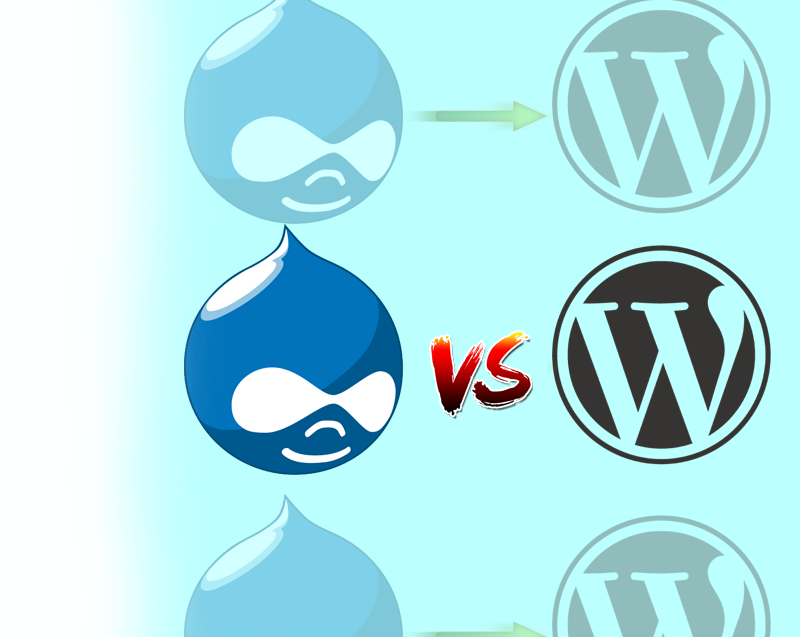- February 20, 2019
- Posted by: fyber
- Category: Development, Website Design
DRUPAL vs WORDPRESS
There have been quite a lot of assumptions and debate over the question, which is a better website building platform, WordPress or Drupal? As such, everybody holds their personal opinions. However, there is one thing which is undoubtedly common in both – these are content management system (CMS) tools that are built for the internet.
A CMS tool is one such internet tool that allows individuals and professionals to create and manage websites, including its contents and database.Each of these CMS tools play significant roles in the design, development, customisation and management of websites. Today, there are millions of individuals as well as businesses who either use Drupal or WordPress CMS tool for their required website development purpose.

While, there are some who prefer using another related CMS tool which provides similar or unique features that allow users to carry out their required tasks effectively. Therefore, it’s all a matter of an individual’s choice.
Here, we shall make a few important comparisons between Drupal and WordPress content management system (CMS) and leave it to you to decide which among these you find the best.
COMPARISON BETWEEN DRUPAL AND WORDPRESS CMS TOOLS
Comparison of Drupal and WordPress CMS platforms are carried out on the following vital grounds:
Popularity
Drupal
Drupal CMS tool has been around for the past 18 years, since its development in the year 2000. However, it has a mere 2% of websites that run on the internet. When it comes to popularity, Drupal is adopted by notable organisations like NASA, University of Colorado and enterprises like Dallas Cowboys, The Economist, State of Colorado, etc.
WordPress
WordPress came into being 15 years ago, in the year 2003. It has more users and its share on the internet is greater in numbers. WordPress is popular among companies like Mercedes Benz, Sony mobile, TechCrunch website, The New Yorker, the White House, etc.
Usage
Drupal
Drupal CMS tool is significantly suitable for web developers more than novice users because of its sophisticated technology. The CMS tool provides users with fairly limited basic website creation privileges. It is offered to users as free and premium package plans.
WordPress
WordPress, on the other hand, is primarily targeted towards individuals who are not technically sound. The CMS tool lets you build a basic website quickly and allows you to further customise the site’s layout to add to your taste. It also comes both as free and premium package plans.
Performance
Drupal
Security and performance are the two advantageous factors of Drupal. It allows users to build websites and create several pages without affecting performance. The CMS tool has the ability to support multiple pages of a site and is low on system resources. It does not let your website down
WordPress
WordPress, however, lacks both in security and performance when compared with Drupal. WordPress is not built to handle large number of website pages and content as it tremendously slows down the performance. Thus, creating large websites on the WordPress platform may not be a wise idea.
Extensibility
Drupal
Users can customise their Drupal sites with free and premium themes, plug-ins, applications, etc. There are quite a number of built-in themes and plug-ins available which can be downloaded and installed via the Drupal CMS tool. But again, it has very few scope of extensibility and non-tech savvy users may experience difficulties when customising their sites.
WordPress
WordPress too, offers a far greater number of free and premium themes and in-built plug-ins that allow users to visually enhance their sites. Customising sites in WordPress is not very difficult. There are many elements which can be modified based on the user’s needs. It has a good scope for extensibility and provides a decent overall experience.
Security
Drupal
When it comes to security, Drupal stands apart. The reason for Drupal being a security-driven CMS tool is because of the fact that it is mainly used by enterprises. Therefore, it includes enterprise-level security that keeps government and organisation sites safe from vulnerabilities. Another logical reason is that since, Drupal has lesser popularity, many attackers do not bother targetting its user base.
WordPress
Compared to Drupal, WordPress is slightly low on its safety and security measures. Because of its growing popularity among internet enthusiasts, it also attracts hackers and other online attackers to compromise users’ sites by transmitting vulnerabilities. So, security becomes bit of a concerning factor in WordPress. Websites can be hacked easily and may even become partial or totally non-functional, if proper security measures are not taken.
Functionality
Drupal
The website-builder tool’s interface in Drupal can be somewhat tricky, especially for new users. So, when creating a standard website, the user may find things a little too complicated. Other than that, Drupal websites are offered with a lot of built-in features that improves its functionality. One such feature is the search engine optimisation (SEO), which allows users’ sites to be indexed and ranked in search engine sites.
WordPress
When compared with Drupal’s user interface, WordPress is rather more easy to use. Users can create a basic site within minutes Although there are certain limitations, the user can have his/her website setup quickly with many built-in features which provide many functionalities. However, similar to Drupal, WordPress sites are SEO-friendly, too. WordPress sites can be searched easily on various search engine sites.
Well, these are the few important grounds on which the comparison has been made between Drupal and WordPress CMS tools. Analysing these will help you decide better which CMS tool you would prefer when creating a website, which you might probably use for your personal passion or for your business.
